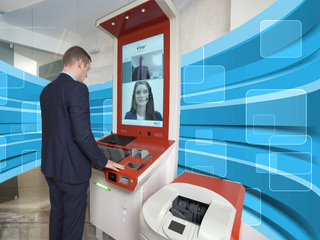Nowadays, remote customer support provided by the bank staff during routine self-service operations is a good practice.
 Nowadays, remote customer support provided by the bank staff during routine self-service operations is a good practice. Fast-paced telecommunication development, requiring for the video communication, provides for financial Institutions the opportunity to reach their clients via the new modern and credible channel. However, the set of concerns about the practical application of such solutions is more than real for banks.
Nowadays, remote customer support provided by the bank staff during routine self-service operations is a good practice. Fast-paced telecommunication development, requiring for the video communication, provides for financial Institutions the opportunity to reach their clients via the new modern and credible channel. However, the set of concerns about the practical application of such solutions is more than real for banks.
To proof its tenability of the new interaction channel tending to be the keystone in banks customer-centric strategy fine words are not enough. First, it is important to dispel the most common myths around video banking.
Myth #1. No space for video banking
Beyond all doubt, every FI builds its own development strategy and set the priorities of interaction channel with the clients. There is plenty of banks around the world who are cautious for some reasons about the investments in ATM networks and have only a few dozens of self-service devices for hundreds of thousands clients. Other organizations enhance their self-service channels and mobile banking to leave behind the traditional brick-and-mortar bank branches.
As the technical base, the existing call center and a self-service device fleet can be used, since most modern terminals are equipped with video cameras and other necessary equipment. Using the reliable internet connection an operator at the Distance Service Center (DSC) is able to be in touch with any single client who uses one of thousands ATMs or other remote terminals. The operator can provide online consultations regarding self-service device work or some bank products.
Person-to-person communication during the video connection increases the client confidence and loyalty to the bank’s brand. As a result, FIs kill two birds with one stone: make their product and service more convenient and steadily develop its own image.
Myth 2: Video banking is overcomplicated
In fact, any bank may start introducing the video banking services without revolutionary infrastructure changes. Present-day solutions empower interactions with the customer using various ways: multifunctional self-service terminals and mobile devices.
Of course, in order to provide the majority of advanced banking services, the functionality of a standard ATM is not sufficient. The hardware-software complexes from specialized manufacturers with built-in printers, scanners, multimedia and other equipment allow using various identification mechanisms (such as reading biometric data, bank cards, personal identification data, etc.) to sign contracts and other documents, make payments and perform standard banking operations like withdrawal, deposition and transfer of funds. In this case, the bank gets at its disposal designed and prepared for implementation device for work device, the introduction of which into the infrastructure of the bank does not take much time.
By using these tailored self-service terminals for video banking, the financial institutions, on one hand, provide additional services for customers and increase the value of interaction. On another hand, these complexes extremely simplifies all kinds of banking operations for the end-users, especially for senior people and clients with special needs.
Myth #3: Video banking is disproportionately expensive
It is possible, that the cost of implementing and ownership of tailored for video banking terminals is a huge stop factor. However, it is true only at first glance. According to the estimates of the expert in the field of banking technology, Dmitry Miroshnikov, the virtual office (DSC) cost is an average 16 times cheaper than the traditional banking branch.
Moreover, it is not only generates the saving in office expenses and staff salaries, but also provides centralized control over the quality of supporting and consulting services: it is much easier to monitor the efficiency of a compact team of DSC operators than to monitor consultants in each bank branch.
Thus, the desire to "humanize" the interaction between the client and ATM by using of video communication, solves the problem of cost optimization for banking business. This is the main driver for the implementation of video banking systems on the market: according to the results of the European Association of Financial Management (EFMA) study, conducted in 2016, about 80% of the surveyed banks plan to introduce video banking services for their customers in the near future.
BS/2 presents VTM.iQ - multivendor solution for ATMs and multifunctional terminals for video banking and advanced operations. Based on UT.VTM.iQ and MT.VTM.iQ terminals, the solution is able to provide access to the most banking services: receiving and withdrawing cash, transferring funds from one account to another, opening an account, ordering and paying for other banking products, signing contracts, printing checks and receiving payment cards. In addition, the solution can be deployed on existing ATM fleet that has the functionality to provide audio or video communication, regardless of the types and models of devices, as well as their manufacturers.